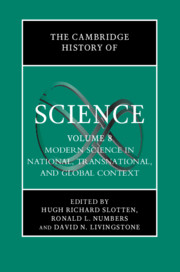Book contents
- The Cambridge History of Science
- The Cambridge History of Science
- The Cambridge History Of Science
- Copyright page
- Contents
- Notes on Contributors
- General Editors’ Preface
- 1 Introduction
- Part I Transnational, International, and Global
- Part II National and Regional
- Europe
- Africa, the Middle East, and South Asia
- East and Southeast Asia
- United States, Canada, Australia, New Zealand, and Oceania
- 34 United States
- 35 Australia, New Zealand, and Oceania
- 36 Canada
- 37 United States, Canada, Australia, New Zealand, and Oceania: A Commentary
- Latin America
- Index
34 - United States
from United States, Canada, Australia, New Zealand, and Oceania
Published online by Cambridge University Press: 21 March 2020
- The Cambridge History of Science
- The Cambridge History of Science
- The Cambridge History Of Science
- Copyright page
- Contents
- Notes on Contributors
- General Editors’ Preface
- 1 Introduction
- Part I Transnational, International, and Global
- Part II National and Regional
- Europe
- Africa, the Middle East, and South Asia
- East and Southeast Asia
- United States, Canada, Australia, New Zealand, and Oceania
- 34 United States
- 35 Australia, New Zealand, and Oceania
- 36 Canada
- 37 United States, Canada, Australia, New Zealand, and Oceania: A Commentary
- Latin America
- Index
Summary
When the thirteen English colonies in North America became the United States of America in the 1770s, they possessed relatively few scientific institutions. However, by this time Americans enjoyed sufficient wealth and leisure to support fairly robust scientific communities in Philadelphia and Boston and moderately active ones in Charleston and New York. The most enterprising members of these communities worked closely with the major scientific centers of the Old World while at the same time developing intercolonial ties. Cultivators of natural history established an informal network of correspondents, and the American Philosophical Society, though essentially a Philadelphia institution, reached out to natural philosophers in every colony.
- Type
- Chapter
- Information
- The Cambridge History of Science , pp. 641 - 711Publisher: Cambridge University PressPrint publication year: 2020

